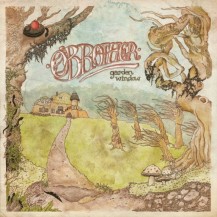O’Brother’s “Garden Window”
“Only a musically mature band can offer an album with this much color.” -Grafton Tanner
Grafton Tanner
8.8
out of 10
O'Brother
Garden Window
November 15, 2011
Favorite Gentlemen
Once there were albums with beginnings, middles, and ends that were as much about pacing and coherence as they were about structure and accessibility. Once I bought them whole and devoured them whole as one entity, side one then side two. A book with chapters. A film with scene changes. Let me be clear: musicians still create albums. But there is no denying that the album has become fragmented in the Digital Age. Bands on the rise are more concerned with getting the music to the public, not creating the musical equivalent to the Great American Novel. Once bands have secured a footing in the industry, they can then worry about writing their own Mellon Collie and the Infinite Sadness or Loveless. What I mean is, very few seek to do what O’Brother just did.
Approaching Garden Window, I still had the echoes of “Ascension” roaring distantly in my ears. The Death of Day left me with the feeling that O’Brother could stake their claim as a group making artistic, adventurous music while still remaining characteristically heavy and raw. Then they sought out to make a cohesive work of art, an album in every sense. Garden Window is one of the most complete-sounding albums I have heard in a long while, and it’s a debut full-length. I can approach it as a collection of solid songs, one right after the other. But what sets it apart from so many other debut albums is that it completely states what O’Brother is and what they are capable of doing.
From the outset, O’Brother is frightening and brooding. “Malum” doesn’t begin; it falls on you like some massive beast. Rims click and drums pound beneath a garbled chant and the guttural sludge of lower-than-low guitar and bass. It evokes a ritual or a slow danse macabre about the altar. This native, primitive feeling is something O’Brother succeeds at creating. Tanner Merritt’s lyrics are rife with natural imagery: the soil and the dirt and the sun. It’s earthen music that seems to stretch all boundaries of time. After this haunting introduction, things become a bit more grounded with “Lo.” It’s easily the “hit” of the album, very digestible and extremely catchy. The song isn’t a surprise. O’Brother is every bit as talented at creating beautiful and alien landscapes as they are at writing a solid hook, which immediately reminds me of another artist you may know: Radiohead.
Radiohead is here within O’Brother’s music. It’s evident, and it’s most certainly a good thing. Like Thom and company, O’Brother makes rock music with its choruses and singalong moments while still pushing the boundary of what rock music is actually about. “Poison!,” seriously one of the best songs I have heard, begins with Tanner and a haunting piano riff that is reminiscent of “Pyramid Song” and “Everything In Its Right Place.” The rest of the band kicks in. Anton Dang’s bass roots the progression for a literal second, disappears, and leaves space for the guitars and drums to move the song forward. Radiohead’s fragmented arranging and surprising instrumental flashes are here in Garden Window. Influence, absolutely. But for O’Brother, it’s a way of thinking. The album, like Ok Computer or The Bends, becomes a crash course in how to rework a popular genre into something bolder and better than it ever was. I’m not stretching when I say O’Brother can take the reins.
There’s a lot of terrain covered in Garden Window. The weighty, multi-part suites are never over-wrought and are equally balanced with more concise pieces that move the album forward. “Last Breath” closes the entire thing with a soft murmur. It is the perfect blend of spectral beauty and foreboding strangeness, wrestling with the idea of God and of death and of how to end an album that stretches its ancient limbs across so many lands. The light, wispy guitars and vocal choirs are ghostly and childlike at the same time, like a spirit whispering a lullaby to the living love it left behind. “You are the only thing I hope is real in a dark world.” In the mystical universe O’Brother has woven, there indeed exists this darkness and whimsy and love and despair. They recognize it all with the hope that something tangible can exist amongst the darkness. Something natural and without the constraint of time. Heavy stuff, I know. Only a musically mature band can offer an album with this much color. Did I mention this is a debut?
